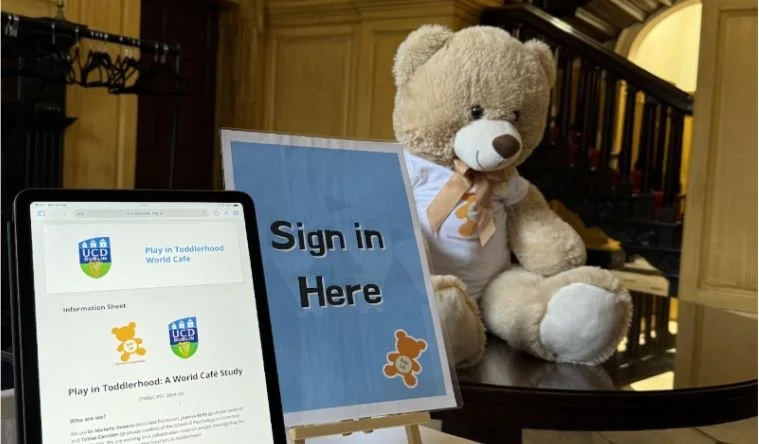Grab a chair – let’s talk about play!
Written by Joanna Kelly. Edited by Tobias Constien.
This February, we hosted an event for parents and guardians to discuss their perceptions and experiences of play in toddlerhood. This event was held in the beautiful MoLI – the Museum of Literature Ireland on the edge of St. Stephen’s Green. We got a diversity of perspectives from parents on the role of play in toddlerhood, which will now inform our ongoing research.
In our event we used a popular research method, the World Café, to explore the topic of play and its role during the toddlerhood period with parents and guardians. The World Café research method was first developed by Brown and Isaacs (2005) and has since been used frequently in research (Schiele et al., 2022). It encompasses a community-based approach where participants gather at round tables to discuss key questions while rotating between tables. The process invites a warm and welcoming atmosphere where participants are encouraged to enjoy a cup of coffee and pastries over their conversations.
We felt that the World Café approach was well suited for our goals as the period of toddlerhood is a particularly new area of research in the study of play. Despite the importance of play in children’s development, there is little research on toddlers, as most of the literature focuses on preschool and school-aged children. Therefore to begin our research, we invited parents of toddlers to talk about their experiences and perspectives on the role of play during toddlerhood.
So, What’s Next?
In our ongoing research, we are interested in the role of play in the development of executive functions. Executive functioning is made up of three core cognitive processes: working memory, inhibitory control, and cognitive flexibility. These processes work together like the brain’s air traffic control system, coordinating our thoughts, actions, and emotions. These processes play a major role in our everyday life and behaviour. Executive functions help children to stay organised, make decisions, and adapt to new situations. Consequently, they are really important in children’s development and enable them to follow instructions, solve problems, adapt to new situations, and more (Morgan et al., 2024).
Specifically, pretend play, in which a child projects some alternate vision onto reality in a spirit of play, can be beneficial for challenging and strengthening executive functions in various ways (Doebel & Lillard, 2023). For example, during pretend play, children are challenged to remember their role, distinguish between reality and pretend, while remaining flexible as the improvised plot unfolds.
Contribute in our research!
Following the World Café, we are now extending our research into play in toddlerhood with the SCOOT Study. SCOOT stands for Sleep, Cartoons, and Everyday Play in Toddlers. In this online survey, we are interested in the everyday behaviours of toddlers, including their play, screen use, sleep habits, and their links with everyday executive functions.
If you would like to sign up please follow this link!
References
Brown, J., & Isaacs, D. (2005). The World Café: Shaping Our Future through Conversations that Matter. Berrett-Koehler.
Doebel, S., & Lillard, A. S. (2023). How does play foster development? A new executive function perspective. Developmental Review, 67(2), Article 101064. https://doi.org/10.1016/j.dr.2022.101064
Morgan, B., Fiske, A., & Holmboe, K. (2024). Early executive function development: The first three years. In J. H. Grafman (Ed.), Encyclopaedia of the Human Brain (2nd ed.). Elsevier. https://doi.org/10.1016/B978-0-12-820480-1.00078-4
Schiele, H., Krummaker, S., Hoffmann, P., & Kowalski, R. (2022). The “research world café” as method of scientific enquiry: Combining rigor with relevance and speed. Journal of Business Research, 140, 280-296. https://doi.org/10.1016/j.jbusres.2021.10.075


